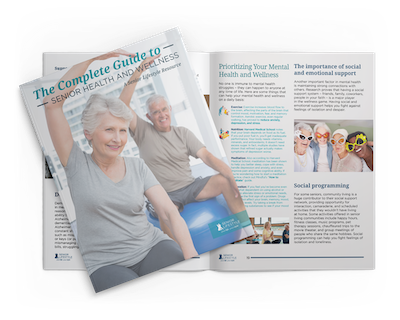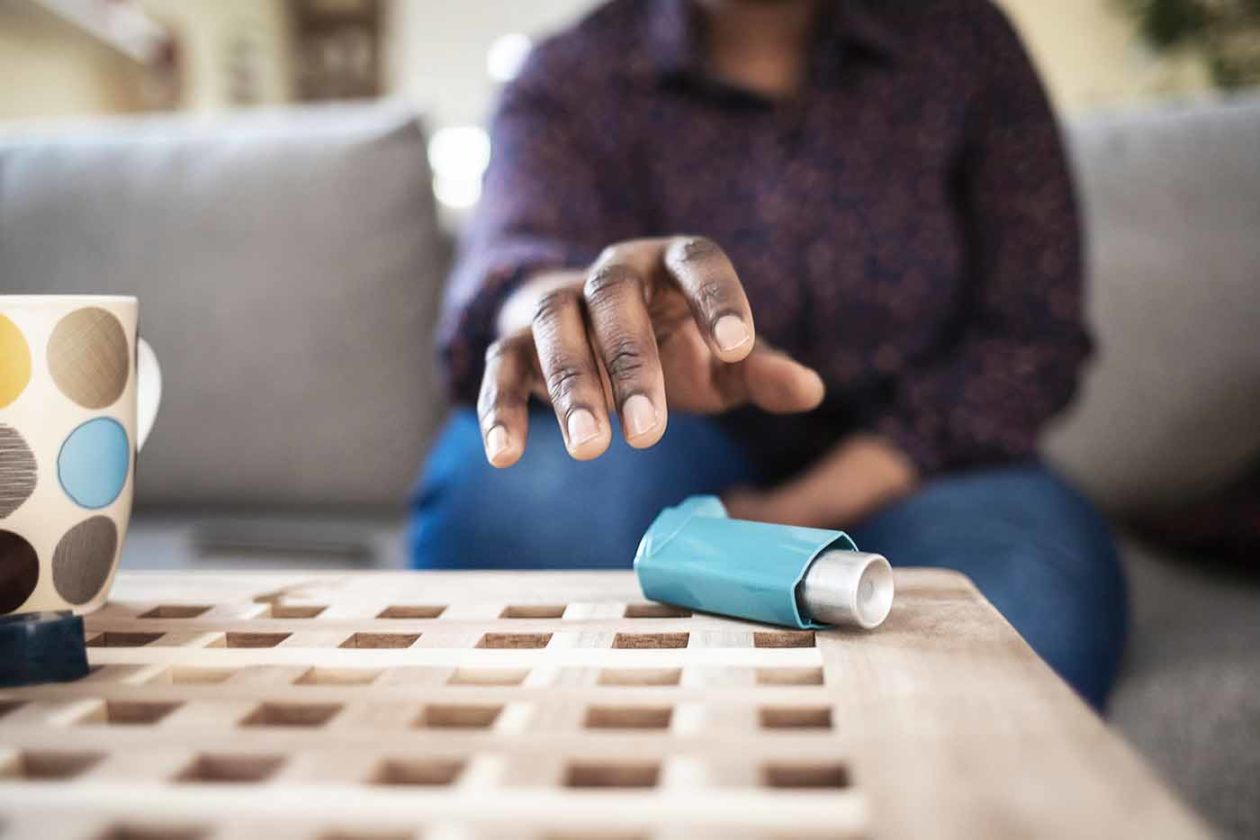Pneumonia is a common senior care problem, often an outcome of other illness or surgery. According to a study cited in the Journal of the American Geriatrics Society, nearly 1 million adults ages 65 and over are hospitalized for pneumonia each year. Emergency-room visits due to pneumonia average 1.5 million a year, according to a study cited by the U.S. Centers for Disease Control and Prevention.
This common lung infection can be brought on by bacteria or viruses, sometimes even fungus or aspirated material – an otherwise non-infectious item inhaled into the lungs, triggering fluid buildup. Pneumonia can attack one or both lungs, filling the air sacs with bacteria or fluid. It can be mild to severe, depending on the person and other conditions. If left untreated, pneumonia in seniors can have serious and lasting effects.
>> Read “How Seniors Can Stay Healthy During Cold and Flu Season”
Learn more pneumonia facts for seniors, why they are more susceptible, what signs to watch out for, and how pneumonia can be treated and prevented.
Why and Where Do Seniors Get Pneumonia?
4 Risk Factors for Senior Pneumonia
There are many reasons older adults are more prone to catching pneumonia. Here is a few of the factors, according to the American Lung Association:
- Chronic illness – Seniors may have more illnesses, such as chronic obstructive pulmonary disease (COPD), which can make the lungs more vulnerable. Other chronic illnesses such as heart disease and diabetes can be risk factors.
- Physical issues – Many seniors have difficulty swallowing, possibly due to dementia, Parkinson’s disease, stroke, or other neurological conditions. This can result in aspiration of food, vomit or saliva into the lungs that then becomes infected.
- Recent hospitalization – Seniors may be vulnerable due to recovery from surgical procedures. Exposure to other ill persons in intensive care or spending time on a ventilator can be aggravating factors.
- Weakened immunity – Many seniors have weakened immune systems, likely a combination of aging and possibly medications to treat chronic conditions.
4 Causes of Pneumonia in Seniors
There are several types of pneumonia categorized by how they occur. Here are the most common ways pneumonia can be contracted, according to the Mayo Clinic:
- Aspiration pneumonia – As noted above, anything that enters your lungs other than air – food, drinks, saliva, vomit – can cause pneumonia. Some medical conditions such as dementia, Parkinson’s disease and strokes can affect the normal gag reflex, which may aggravate susceptibility to pneumonia.
- Community-acquired pneumonia – This can be contracted during everyday interactions. Bacteria or viruses from the nose or sinuses that can be successfully fought in younger people can cause an infection in seniors because of their depressed immunity.
- Health care-acquired pneumonia – This can occur in people who live in long-term care facilities or who receive care in outpatient clinics. Seniors may be exposed to bacteria that are more resistant to antibiotics.
- Hospital-acquired pneumonia – People in the hospital are already sick and have a more difficult time fighting off pneumonia. Plus, bacteria and viruses in hospitals may be more resistant to treatment.
What Are Symptoms of Pneumonia in Seniors?
- Chest pain – Lung infections can cause pain when coughing or even breathing deeply. A sharp, stabbing pain in the chest may be felt.
- Chills or Fever – Pneumonia usually gives people a fever, but it’s not unusual for older adults with a weakened immune system to have a cooler body temperature.
- Confusion – Exhaustion and infection, especially in seniors, can lead to temporary confusion and slips in mental awareness.
- Cough – A cough that doesn’t clear up can mean pneumonia. It can be a dry cough, or there can be mucus. The buildup in the lungs may produce mucus that is greenish, yellow or even bloody.
- Fatigue – The body can be sapped of energy as the infection is fought.
- Shortness of breath – It can be hard to catch a breath when the lungs are filling up. Rushing across the room or climbing stairs can cause difficulty breathing.
Other symptoms may include diarrhea, headache, low blood-oxygen levels, muscle pain, nausea and vomiting.
Seniors may also contract a milder version called “walking pneumonia,” which produces milder symptoms.
What Risks Does Pneumonia Pose for Seniors?
Pneumonia must be treated quickly, but even with treatment, pneumonia can present complications for seniors. Among the risks, according to WebMD:
- Bloodstream bacteria – This condition, called bacteremia, occurs when bacterial pneumonia spreads to infect other organs, potentially causing organ failure. Sepsis, an infection of the blood, is also a serious, life-threatening condition.
- Difficulty breathing – With chronic lung diseases present, or if it is severe enough, pneumonia can cause difficulty getting enough oxygen. Hospitalization and use of a ventilator may be called for.
- Fluid around the lungs – Pleural effusion is a buildup of fluid in the space between the lung lining and the pleura or chest cavity. If that fluid becomes infected, it may need to be drained through a chest tube or removed through surgery.
- Lung abscess – If pus forms in a lung cavity, an abscess occurs. It usually is treated with antibiotics, but may also have to be drained with a tube, needle or surgery.

Download The Complete Guide to Senior Health and Wellness
As people grow older, their health and wellness needs change. Read our eBook, "The Complete Guide to Health & Wellness for Seniors" for everything you need to know about staying healthy and happy as we age.
Download the GuideHow Can Seniors and Caregivers Prevent and Treat Pneumonia?
Preventing Pneumonia
To stave off pneumonia, WebMD recommends the following:
- Get vaccinated – There are vaccines to prevent pneumonia, along with the flu vaccine to protect your lungs. Both seniors and their caregivers should be fully vaccinated.
- Practice good hand hygiene – Respiratory infections can lead to pneumonia, so hand washing and sanitizer can be a protective step.
- Stay away from smoke – Quit smoking or get those around you to refrain. Tobacco smoke damages your lungs’ natural defenses against respiratory infections.
- Strengthen your immune system – Get enough sleep, exercise regularly, eat a healthy diet, drink plenty of water, limit your alcohol intake.
Treating Pneumonia
Depending on the severity of your condition, doctors will likely start with antibiotics or over-the-counter medicines to treat pneumonia:
- Antibiotics for bacterial pneumonia
- Antivirals for viral pneumonia
- Antifungals for fungal pneumonia
- Over-the-counter medicines to reduce fever or to ease breathing
If hospitalization is called for, fluids, oxygen or a ventilator may be prescribed.
Stay Healthy and Safe at Senior Lifestyle Communities
Senior Lifestyle communities provide for the health and safety of its residents. You’ll find that we take wellness seriously as you read about “The 6 Elements of a Fulfilling Lifestyle.” Find out more about Senior Lifestyle communities by contacting us today.

